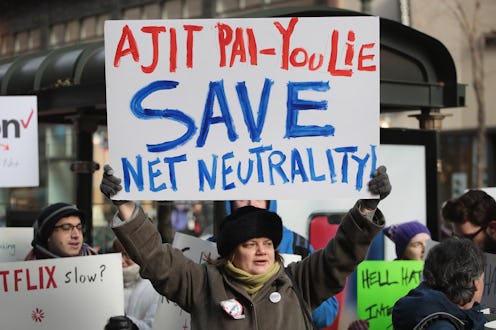News
Net Neutrality Can Be Saved Even If It's Repealed — Here's How

Federal Communications Commission Chairman Ajit Pai's year-long crusade to deregulate the internet has just about reached fruition. On Thursday, the Republican-led FCC will vote on repealing their own rules that ensure that all internet traffic is protected fairly. Passed under the Obama administration, they make sure you can't be charged more by your internet service provider for access to certain sites. It also prohibits them from slowing down services like Netflix. The demise of the rules is all but certain, but there is still hope. Net neutrality can still be saved after the FCC's vote Tuesday.
That said, it'll be an uphill battle to bring back an open internet if net neutrality is repealed. The FCC is voting to change rules, not law. So, that means there are a lot of ways that the current rules could be kept or brought back. They include a court order, a bill passed in Congress and signed by President Trump, or a future change of heart by the FCC's commissioners.
One of the first attempts will be through federal lawsuits. Public Knowledge, Common Cause, and Free Press are three groups that have committed to taking the rule changes to court if the repeal is successful. After the FCC's vote, some or all will likely go to the Appeals Court for the District of Columbia to block the change. They can argue that the rule change is "arbitrary and capricious" because it's undoing rules that the same federal agency just passed in 2015 and defended in court until last year. The litigation could take years, and meanwhile it is possible that the old rules could remain in effect.
The next way that the rules could be brought back is through the passage of a law in Congress. Given the Republican majority, it could be difficult but not impossible with enough pressure. Some representatives from the GOP have actually voiced their opinion to the rule roll back. Rep. Mike Coffman wrote a letter to the FCC asking that the agency delay and let Congress solve the issue with a bill. Coffman wrote:
The Internet has been and remains a transformative tool, and I am concerned that any action you may take to alter the rules under which it functions may well have significant unanticipated negative consequences. Therefore, I urge you to delay your upcoming vote and provide Congress with the opportunity to hold hearings on the net neutrality issue and to pass permanent open Internet legislation.
Others, including Republican Sens. John Thune of South Dakota and Susan Collins of Maine, are on the record supporting net neutrality. Collins was actually the first Republican to publicly do so. She said the new rules would allow internet service providers to offer service in an "anti-competitive way that limits consumers’ choices."
If it doesn't happen in this Congress, it could still happen after the 2018 elections, with a potential Democratic majority in one or both houses. Democrats already have spoken out in large numbers against the plan. Groups in support of an open internet have pledged that they will run ads against politicians who do not support net neutrality, and some have run billboards against certain members of Congress already. There's a growing thought it could become a major campaign issue.
The final way for the rules to come back would be for the FCC to change course again in the future. Their likely vote on Thursday amends the agency's own rules. There's no reason it couldn't decide to do that again when there's a majority of commissioners who support net neutrality. That would likely mean after the next Democrat wins the White House. Patel's term as chairman will last five years.
The claims that the FCC will destroy the internet are extremely bleak. So, take comfort in possibilities of rolling back the rollback.